通过联合仿真分析优化火花点火发动机的火花正时
IF 3
4区 工程技术
Q3 ENERGY & FUELS
引用次数: 0
摘要
在各机构不断降低内燃机(ICE)驱动的道路车辆二氧化碳和污染物排放限制的压力下,汽车行业正经历着翻天覆地的变化。在不影响当前汽车生产的情况下,实现运输行业去碳化的一种方法是为内燃机(ICE)采用替代燃料。氢气具有零碳含量和极高的层燃速度,可以延长贫燃极限,因此非常具有吸引力。其他替代燃料还有甲醇和乙醇。这项工作涉及将一辆由三缸火花点火(SI)发动机驱动的小型乘用车改装为使用替代燃料。特别是对火花正时进行了优化,以提高各种工况下的燃油经济性。优化程序基于 MATLAB/Simulink® R2024a-GT-Power 协同仿真分析,通过独立改变每个气缸的火花正时,最大限度地降低燃油消耗。特别是在满负荷时,该算法仅针对检测到爆震的气缸减少火花正时,与基本标定相比,油耗降低了约 2%。今后将采用这种方法来了解替代燃料的使用对点火控制策略的影响。本文章由计算机程序翻译,如有差异,请以英文原文为准。
Spark Timing Optimization through Co-Simulation Analysis in a Spark Ignition Engine
The automotive industry is experiencing radical changes under the pressure of institutions that are increasingly reducing the limits on CO2 and pollutant emissions from road vehicles powered by internal combustion engines (ICEs). A way to decarbonize the transport sector without disrupting current automotive production is the adoption of alternative fuels for internal combustion engines (ICEs). Hydrogen is very attractive, thanks to the zero-carbon content and very high laminar flame speed, allowing for extending the lean burn limit. Other alternative fuels are methanol and ethanol. This work deals with the conversion of a small-sized passenger car powered by a three-cylinder spark ignition (SI) engine for the use of alternative fuels. In particular, the spark timing has been optimized to improve the fuel economy under every operating condition. The optimization procedure is based on the MATLAB/Simulink® R2024a-GT-Power co-simulation analysis and minimizes the fuel consumption by varying the spark timing independently for each cylinder. In particular, at full load, the algorithm reduces the spark timing only for the cylinder in which knock is detected, reducing fuel consumption by about 2% compared to the base calibration. This approach will be adopted in future activities to understand how the use of alternative fuels affects the ignition control strategy.
求助全文
通过发布文献求助,成功后即可免费获取论文全文。
去求助
来源期刊

Energies
ENERGY & FUELS-
CiteScore
6.20
自引率
21.90%
发文量
8045
审稿时长
1.9 months
期刊介绍:
Energies (ISSN 1996-1073) is an open access journal of related scientific research, technology development and policy and management studies. It publishes reviews, regular research papers, and communications. Our aim is to encourage scientists to publish their experimental and theoretical results in as much detail as possible. There is no restriction on the length of the papers. The full experimental details must be provided so that the results can be reproduced.
 求助内容:
求助内容: 应助结果提醒方式:
应助结果提醒方式:


